
The warming temperature has led to the emergence of monkeys and lemurs from their treetop perches.
- Rating
- monkeys
- lemurs
- forests
- deforestation
- trees
Tree-dwelling monkeys are forced to spend more time on the ground by rising temperatures and deforestation, where they must find shade and water.
Monkeys and lemurs, who normally live in trees, are coming down to the forest floor in greater numbers as temperatures rise.
Scientists have noted a "concerning" trend in which monkeys are abandoning arboreal lives in an effort to adapt to the increasingly hostile environments of forests degraded by human activity and climate change.
This warning comes after researchers spent over 150,000 hours observing 47 species of tree-dwelling primates in almost 70 locations spanning Madagascar and the Americas. In locations where their forest has been damaged and fragmented, certain primates, such as howler monkeys (genus Alouatta) and bamboo lemurs (genus Hapalemur), spend more time on the ground.
According to Giuseppe Donati of Oxford Brookes University in the UK, one of the study's authors, the results show that these creatures are changing their behavior as a result of climate change and habitat loss. When temperatures rise above the forest canopy, he explains, the animals are pushed to the ground in search of shade and water.
"Humans log the forest in most tropical regions where these animals thrive," he explains. "This makes room for sunlight to pass through, which opens the forest canopy. Inevitably, that will lead to a rise in temperature. According to Donati's observations, bamboo lemurs in Madagascar spend around half of their waking hours on the ground.
"Those bamboo lemurs are often forest dwellers and are tree-dwelling lemurs," he explains. In contrast, "those bamboo lemurs go out of the forest and they graze the grass, a little like small cows," in the south of Madagascar, a fairly fragmented area. The study found that species that dwell in big groups and that consume things other than fruit tend to spend more time on the forest floor.
These findings imply that species with more metabolic plasticity may be able to partially modify their lives in response to climate change and habitat loss.
However, arboreal primates are doomed because of deforestation and climate change, according to Timothy Eppley of the San Diego Zoo Wildlife Alliance, a California-based non-profit organization. It's quite unlikely that any of the species we looked at would make the whole shift to living on land. It's not going to happen in that short of a time frame, and that's why it's not a good long-term solution," he argues.
Protecting the forest we have right now is an urgent priority.
Leave a Reply
Your email address will not be published. Required fields are marked *


